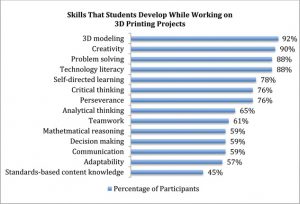My first degree was a B.A. in Sociology with a focus on Social Justice. As a social science, the department required students to conduct their own research projects and take several courses on research methods. I found the concept of quantitative data/research to be fairly straight forward…there are just many, many rules in order to correctly apply and use the data one collects. I enjoyed reading Understanding and Describing Quantitative Data as a review, and found it to be much more clear than the quantitative course I took years ago.
Not the whole article was review however. I was happy to read many facts about quantitative research in the education field as that is not something I had been over before. However, I was then sad to read that quantitative research is particularly difficult in education.
I experienced this while searching for a quantitative article in my field of interest. My school recently acquired a 3-D printer which I have dominion over (this won’t last but I can hope no one else is interested). A search yield 31 articles related to education and 3-D printing. Only two articles were appropriate to the topic while also featuring some quantitative data. Elusive indeed. I read both, but found Why 3D Print? The 21st-Century Skills Students Develop While Engaging in 3D Printing Projects to be the best fit for my interests.
The research was conducted by survey which featured quantitative questions (multiple choice) along with some open-ended qualitative prompts. The research aimed to answer these two questions:
- What skills and knowledge do teachers believe that students develop while working on 3D printing projects?
- How do teachers see 3D printing projects supporting students’ development of 21st-century skills?
The findings were based on the answers to the multiple choice questions as well as the quantified conversion of the qualitative questions. I found the “skills that students develop while working on 3D printing projects” to be what I was most interested in, below:
- Can a mixed method research methodology still fall under the quantitative umbrella?
- Does coding qualitative data make it quantitative?

July 6, 2019 at 9:00 pm
Hey, great start to the program. You raised some interesting points for me too. As a scientist by trade (prior to becoming a science teacher), I too am comfortable with truly measurable quantitative data – dealing in the “hard” science being particularly familiar. My level of comfort with qualitative data is mixed at best, since surveys, questionnaires, feelings, opinions etc, can be less reliable (although reliable in a data set is up for debate). I wrote a blog about this idea myself, and had to set myself steady to recognize that education research is a social science (i.e. “soft” science) meaning that a lot of the qualitative research is going to be converted into coded quantitative data to make the statistically analysis possible. That being said…I am also new to research methodology, so this could all could be a wrong opinion and interpretation. Happy blogging!
July 8, 2019 at 11:27 am
I resonated with this blog entry on two levels: Your background in social justice and struggling with being on the forefront of these design classes which don’t seem to have many assessments available yet.
Your social justice experience enables you to connect with your students on a compassionate level, where you can take into account their backgrounds and stories probably without even realizing. Having a caring understanding of your students makes it very easy to connect with them and quickly become one of their favourite teachers (especially now that you are the one with the 3-D printer!)
3-D printing, coding, programming, and other projects associated with ADST do not usually come with a guide for assessment, because they are relatively new and not a lot of groundwork has been done to determine how we should incorporate marks into these classes. Usually, these projects are done as “fun” end of the year or ungraded projects that allow for students to explore their creativity. You are now in the drivers seat for how we can take those fun and exciting projects and develop some foundational methods of assessment.
I am in the same position and look forward to working on how we can incorporate assessment into these techy projects! Great blog, well done!